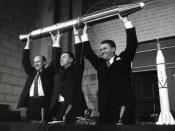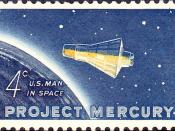The History and Future of Space Exploration
Franklin Cantrell
Earth & Space Science
For centuries man has looked up at the sky in wonder. Primitive man drew pictures of stars on stones and walls. One of the first theories about the stars was that there was a giant dome covering the Earth, with thousands of holes punched in it, with a great fire on the other side of the dome. Later, some cultures believed that the stars and sun were gods watching over us. The universe has always been a source of questions, even before man knew what is now known. It is this innate curiousness that drives us to push our technological limits, and explore the unknown called space. Some critics say that space exploration is a money hole, but if the facts are observed, one can see that almost nothing but good can come from it.
The earliest rockets came from solid fuel fireworks.
The earliest solid rocket fuel was a form of gunpowder, and the earliest recorded mention of gunpowder comes from China late in the third century before Christ. Bamboo tubes filled with saltpeter, sulphur and charcoal were tossed into ceremonial fires during religious festivals in hopes the noise of the explosion would frighten evil spirits. It's probable that more than a few of these bamboo tubes were imperfectly sealed and, instead of bursting with an explosion, simply went shooting out of the fire, propelled by the rapidly burning gunpowder. Some clever observer whose name is lost to history may have then begun experiments to deliberately produce the same effect as the bamboo tubes, which leaked fire. Rocket fire-arrows were used to repel Mongol invaders at the battle of Kai-fung-fu in 1232 A.D. The rockets were huge and apparently quite powerful. According to a report: "When...



This essay is not completely factual
There are some references in this article that should be removed or double checked. The velcro reference in the last paragraph for example is false. NASA did not develop velcro as it was invented by a private engineer.
1 out of 1 people found this comment useful.